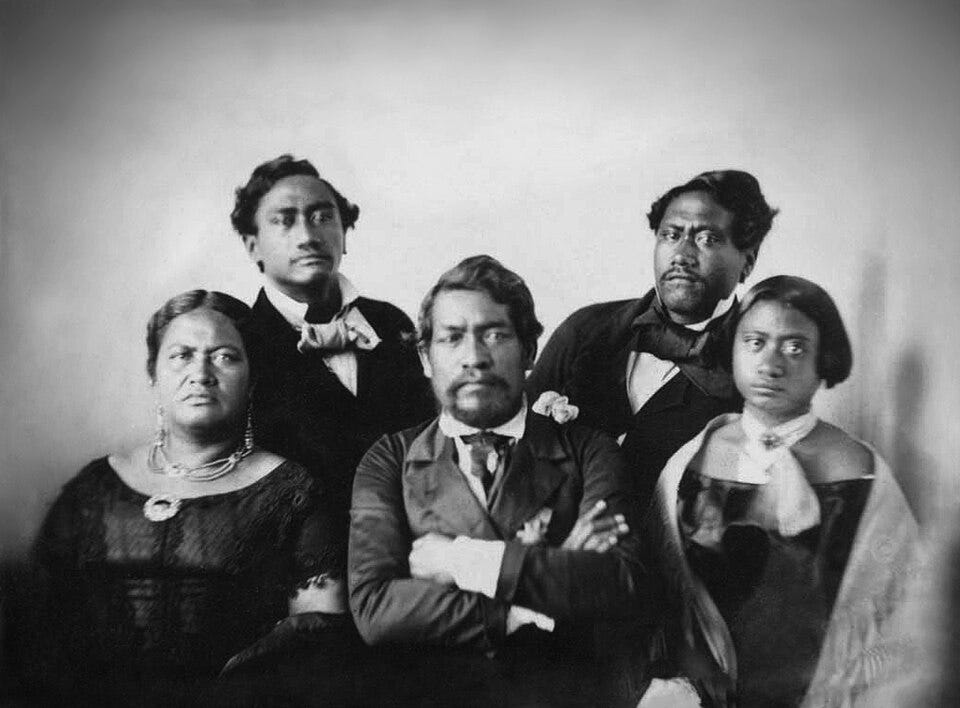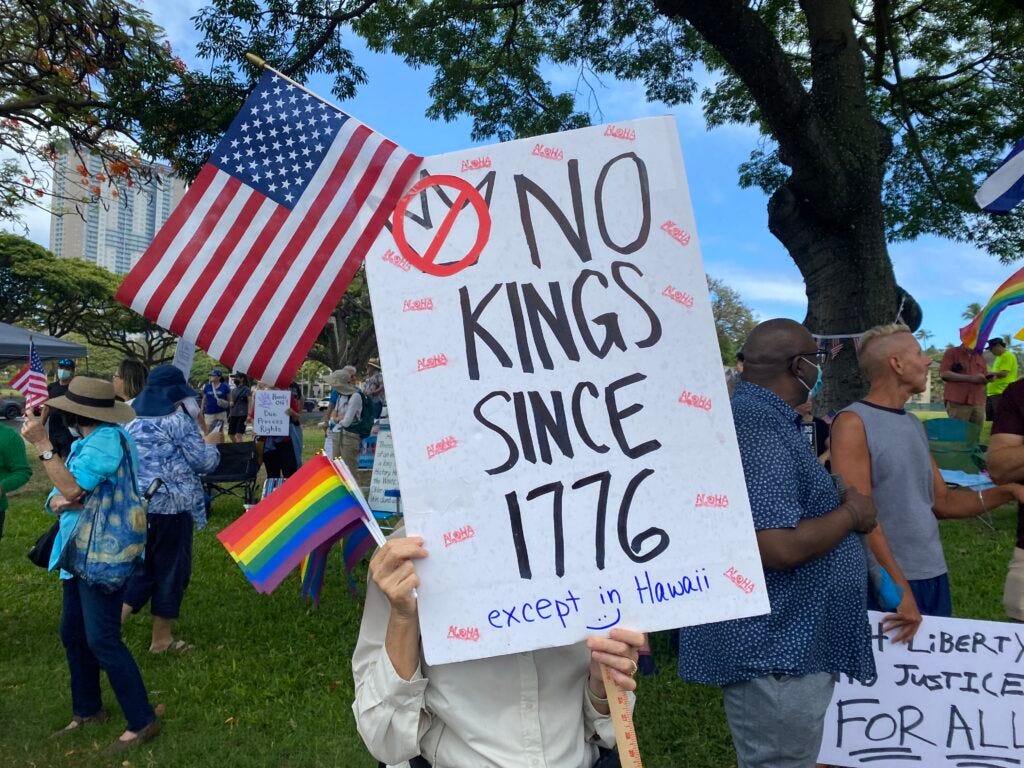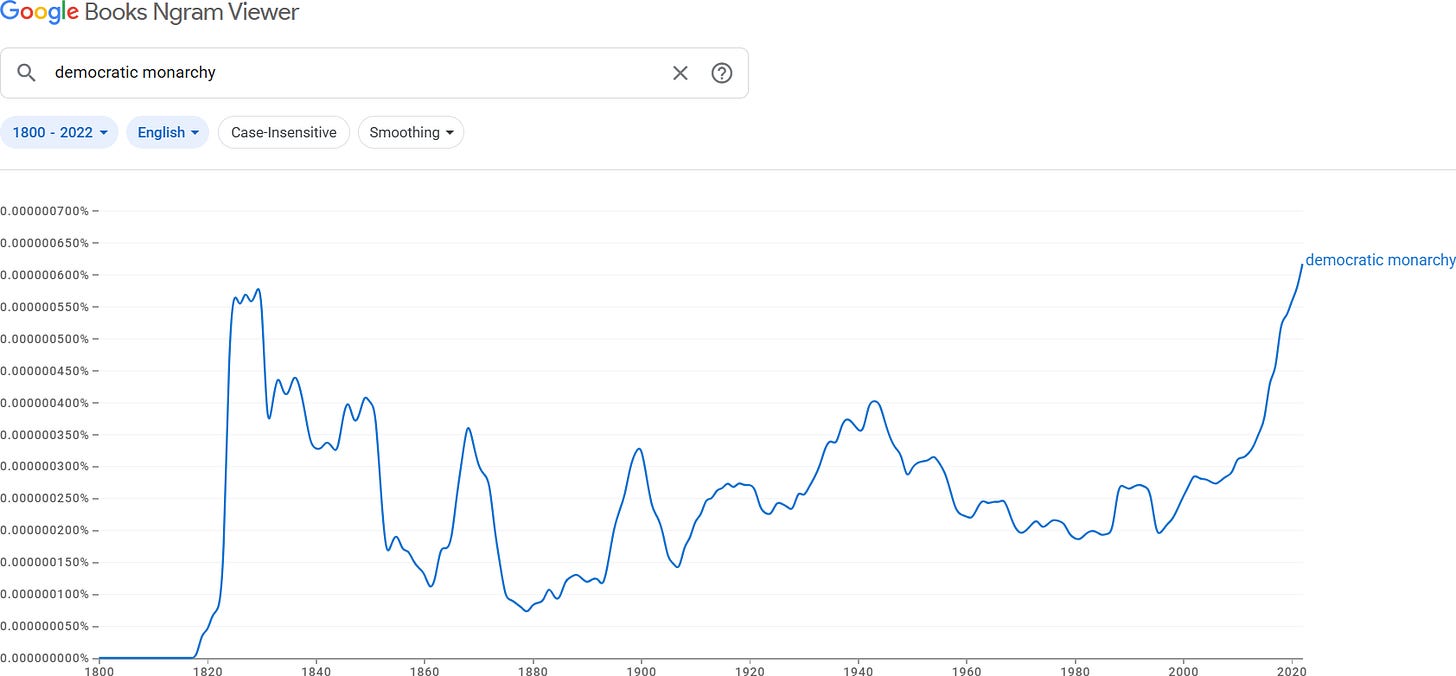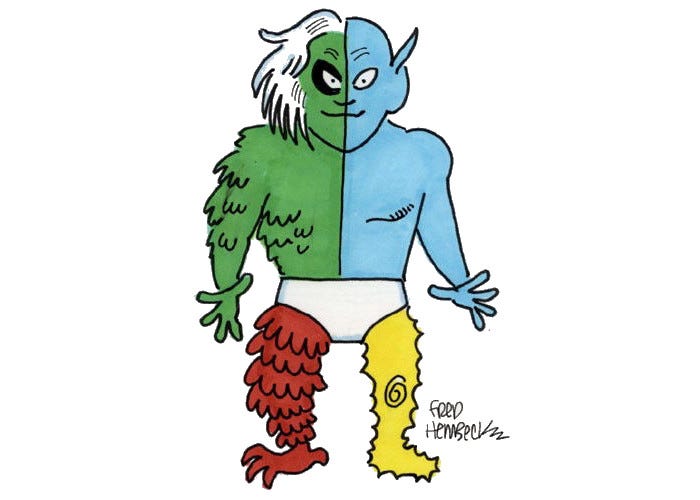Yesterday I wrote about No Kings Day, which seemed like the perfect event for Hipsta Pravda to promote.
Hipsta Pravda is even bluer than already deep blue regular Pravda and Hawaii Nausea which both covered the event. And yet I saw no Hipsta Pravda articles about the event until today - the day after. Why the delay?
The title of one of the articles, “No Faux-King Way”, taken from a sign at the protest, is a clever pun that provides one solution to the apparent contradiction of “No Kings” protesters venerating Hawaii’s kings. Trump is a faux king.
Not a real king like the Kamehamehas (there were five, though everyone mostly talks about the first one).

A Hipsta Pravda commenter asked,
Can you imagine what would have happened if ordinary Hawaiians protested against the authoritarian rule of Kamehameha back then?
The first photo in the article is of a sign that acknowledges the potential conflict - with a smile:
The body of the article provides two other workarounds (emphasis mine):
In recognition of King Kamehameha celebrations, organizers called the protest “No Dictator Day” in the islands.
Few here would dare to refer to the first Kamehameha - or any of his successors - as a “dictator” like Trump.
“Nice to see that a lot of signs have recognized that Hawaiʻi had a long history of a democratic monarchy,” said Jonathan Scheuer, an environmental consultant.
In fact, the 108th King Kamehameha Celebration Floral Parade started at nearby ʻIolani Palace just hours before the midday “No Kings” gathering.
ʻIolani Palace is “the only official royal residence in the United States”.
I confess that I initially thought “democratic monarchy” was a contradiction. But it’s a thing.
Duh …
I did realize my mistake before I checked Google Ngram Viewer and Brave. I thought “democratic monarchy” might be an alternate term for constitutional monarchy - one that I’ve somehow never encountered before.
I did know that the Hawaiian kingdom had constitutions. I had been planning to write about a 1893 revision of the Hawaiian constitution - a justification for the coup that ended the kingdom.
Hawaii had a constitutional monarchy. But was it also a democratic monarchy? Are the two terms completely interchangeable? I asked Brave AI, “how does a constitutional monarchy differ from a democratic monarchy”?
It got the title wrong. A great start …
“and the government is democratic” … but what does “democratic” mean?
I’ll touch on that later. For now, I’m annoyed at how the footnotes are numbered either 4 or 6? Why not 1 and 2? Why list three sources first that aren’t even cited? Imagine students copying and pasting that as is - including the multiple 4s and 6s.
Let’s check out what the humans at Wikipedia wrote:
Constitutional monarchy may refer to a system in which the monarch acts as a non-party political ceremonial head of state under the constitution, whether codified or uncodified. […] Political scientist Vernon Bogdanor, paraphrasing Thomas Macaulay, has defined a constitutional monarch as "A sovereign who reigns but does not rule".
That was my understanding of what a constitutional monarchy was. An understanding probably gained through experience, because I don’t remember the term ever being defined in school.
I could interpret that passage to mean that merely having a constitution does not make a monarchy constitutional - that a constitutional monarchy is more than the sum of two words, because a constitutional monarch is only symbolic - a third word absent from the term.
If a piece of paper (or - these days - a text file) is sufficient to make a monarchy constitutional, then if a monarchy has a one-sentence constitution saying “All power rests in the god-emperor”, that monarchy is constitutional. And I don’t see how one could argue that monarchy is also “democratic”.
I was double-checking to see if “all power rests in the” was a real collocation. The real question is whether “all power rests in the” can be followed by a noun for a monarch.
Looks like I generated sentences AI would never generate because they’re not in the training data. AI is like super autocomplete. It tries to ‘guess’ what’s next based on what it already ‘knows’.
Just like humans (except we don’t need scare quotes around “guess” and “knows”):
Always Autocompleting
Today I heard a YouTuber point out that if you know someone’s stance on one aspect of the Culture War™, you can’t predict their other stances because people are not divided into two and only two camps, Woke and Antiwoke. Someone who sides with the Woke on one issue may side with the Antiwoke on others, and vice versa.
Being an autocomplete machine, I didn’t expect “monarchy” to follow “democratic”. Google doesn’t either.
That second autocompletion dates this image. (The Minnesota incident was on June 14. It already has a Wikipedia article. Anyone remember getting yearbooks to update their print encyclopedias?)
What does democratic mean? I’m tired of screenshotting, and copying and pasting on this computer is hit-and-miss, so I’ll spare you a dictionary definition.
Dictionaries leave out so much about words that have to be learned from experience. I doubt any dictionary is going to tell you this:
Democratic is the opposite sort of word; it indicates that the speaker does like a government. (So far, democratic hasn’t been used as an all-purpose approval marker. But given time …?)
Almost no one in Hawaii dares to diss the Hawaiian monarchy in public.1
The Hawaiian monarchy is GOOD.
Just like democracy is GOOD.
So the Hawaiian monarchy is a “democratic monarchy”. Double GOOD.
If a new Hawaiian monarch took power, would the “No Kings” people say “no”?
To be fair, this isn’t because of mass fear. To a large extent it’s simply because most people here are only vaguely aware of the monarchy. Some immigrants might not know it even existed.
In all my years in school here, the monarchy was never mentioned. Hawaiian history as a whole was never mentioned. Maybe that’s changed after 1993, when savren (sovereign) became the word on the hundredth anniversary of the overthrow of the monarchy. Maybe schools talk about the monarchy now. If they do, I can’t imagine them being critical of it.














